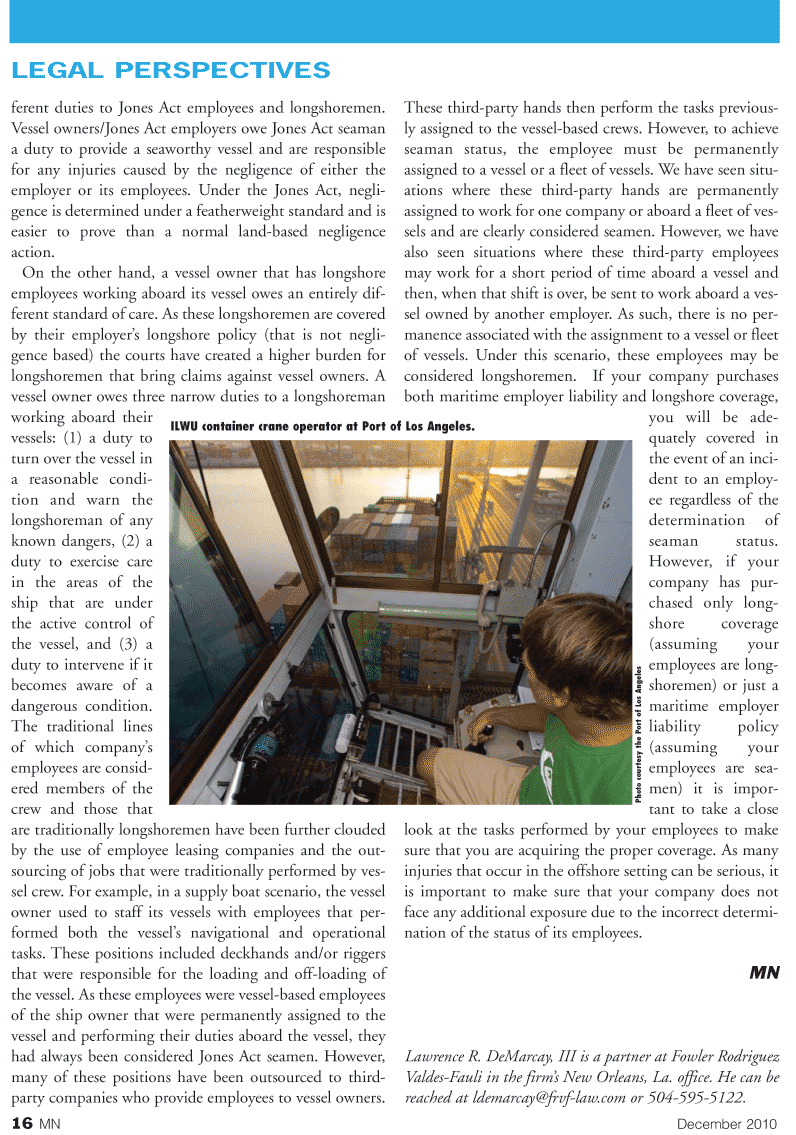
Page 16: of Marine News Magazine (December 2010)
Great Ships of 2010
Read this page in Pdf, Flash or Html5 edition of December 2010 Marine News Magazine
16 MN December 2010
LEGAL PERSPECTIVES ferent duties to Jones Act employees and longshoremen.
Vessel owners/Jones Act employers owe Jones Act seaman a duty to provide a seaworthy vessel and are responsible for any injuries caused by the negligence of either the employer or its employees. Under the Jones Act, negli- gence is determined under a featherweight standard and is easier to prove than a normal land-based negligence action.
On the other hand, a vessel owner that has longshore employees working aboard its vessel owes an entirely dif- ferent standard of care. As these longshoremen are covered by their employer’s longshore policy (that is not negli- gence based) the courts have created a higher burden for longshoremen that bring claims against vessel owners. A vessel owner owes three narrow duties to a longshoreman working aboard their vessels: (1) a duty to turn over the vessel in a reasonable condi- tion and warn the longshoreman of any known dangers, (2) a duty to exercise care in the areas of the ship that are under the active control of the vessel, and (3) a duty to intervene if it becomes aware of a dangerous condition.
The traditional lines of which company’s employees are consid- ered members of the crew and those that are traditionally longshoremen have been further clouded by the use of employee leasing companies and the out- sourcing of jobs that were traditionally performed by ves- sel crew. For example, in a supply boat scenario, the vessel owner used to staff its vessels with employees that per- formed both the vessel’s navigational and operational tasks. These positions included deckhands and/or riggers that were responsible for the loading and off-loading of the vessel. As these employees were vessel-based employees of the ship owner that were permanently assigned to the vessel and performing their duties aboard the vessel, they had always been considered Jones Act seamen. However, many of these positions have been outsourced to third- party companies who provide employees to vessel owners.
These third-party hands then perform the tasks previous- ly assigned to the vessel-based crews. However, to achieve seaman status, the employee must be permanently assigned to a vessel or a fleet of vessels. We have seen situ- ations where these third-party hands are permanently assigned to work for one company or aboard a fleet of ves- sels and are clearly considered seamen. However, we have also seen situations where these third-party employees may work for a short period of time aboard a vessel and then, when that shift is over, be sent to work aboard a ves- sel owned by another employer. As such, there is no per- manence associated with the assignment to a vessel or fleet of vessels. Under this scenario, these employees may be considered longshoremen. If your company purchases both maritime employer liability and longshore coverage, you will be ade- quately covered in the event of an inci- dent to an employ- ee regardless of the determination of seaman status.
However, if your company has pur- chased only long- shore coverage (assuming your employees are long- shoremen) or just a maritime employer liability policy (assuming your employees are sea- men) it is impor- tant to take a close look at the tasks performed by your employees to make sure that you are acquiring the proper coverage. As many injuries that occur in the offshore setting can be serious, it is important to make sure that your company does not face any additional exposure due to the incorrect determi- nation of the status of its employees.
MN
Lawrence R. DeMarcay, III is a partner at Fowler Rodriguez
Valdes-Fauli in the firm’s New Orleans, La. office. He can be reached at [email protected] or 504-595-5122.
Photo courtesy the Port of Los Angeles
ILWU container crane operator at Port of Los Angeles.

 15
15

 17
17
